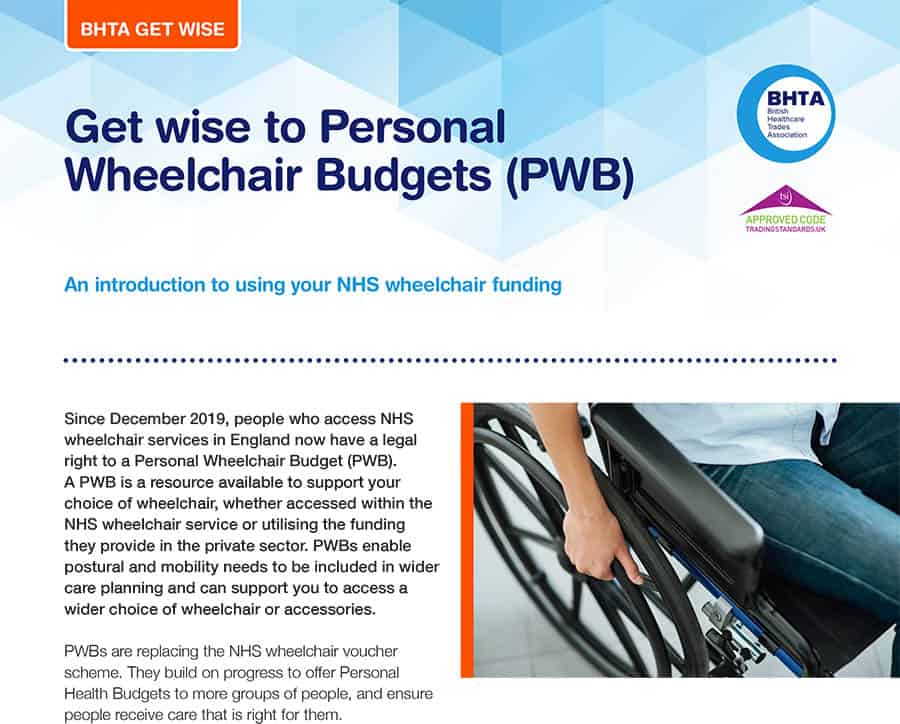New informative guide for wheelchair users on how to access PWBs

The British Healthcare Trades Association (BHTA) has published a new guide for users about Personal Wheelchair Budgets (PWBs) and how they form part of their wider health and social care plans.
A PWB is a funding resource that allows patients to purchase their own wheelchair, whether accessed through the NHS wheelchair service or using the money to purchase a wheelchair privately.
The BHTA’s latest guide – ‘Get wise to Personal Wheelchair Budgets (PWB)’ – gives patients an oversight of how they can access and use this wheelchair funding.
PWBs are designed to give clients more freedom, flexibility and control over the type wheelchair they want. Patients can choose from a wider range of wheelchairs and accessories via PWBs to meet their wider health and care needs. For example, individuals could use the money to purchase additional features such as seat-raisers, electric powered leg-lifters and better-quality postural management cushions.
The wheelchair budgets also aim to break down barriers between health and social care and provide more person-centred care, meaning that health and social care organisations work together to meet the individual’s mobility and postural needs.
Since December 2019, people who access NHS wheelchair services in England now have a legal right to a PWB. They are replacing the NHS wheelchair voucher scheme and build on progress to offer Personal Health Budgets (PHBs) to more groups of people and ensure people receive care that is right for them.
A PHB is an amount of money to support a person’s health and wellbeing needs, which is planned and agreed between the person, their representative, or, in the case of children, their families or carers and the local NHS team.
PWBs are a type of PHB and relate specifically to people being able to purchase manual and powered wheelchairs.
People who have been referred to, and meet the eligibility criteria of, their local NHS wheelchair service and receive a face-to-face assessment with a clinician are eligible for a PWB. The amount of money allocated in the wheelchair budget is based upon what it would cost the NHS to meet the person’s assessed postural and mobility needs via the wheelchair service.
Patients can also top up their PWB fund with funding from other sources, such as from educational or charity funds.
The BHTA explains: “The PWB will have the value of the basic chair as a starting point, and this can be supplemented from your Personal Health Budget, from your social services Personal Budget, from educational funds, from charity funds, and/or from your own personal funds.”
After patients have had a face-to-face assessment and outlined their health and wellbeing outcomes, information is provided upfront about the amount of money available in the individual’s wheelchair budget and the options available locally.
The guide outlines that in many parts of England, users can take their PWB to a private mobility manufacturer or retailer to purchase a wheelchair. If a user purchases a wheelchair privately, the clinician responsible for the patient’s care plan will need to agree that the chosen mobility aid is appropriate and meet’s their wider care needs.
However, the BHTA notes that there is a postcode lottery element to third-party purchasing as it depends on where the user lives and their local wheelchair service’s policies.
A PWB can be managed in one of the following four ways:
- A notional PWB: this is where the person chooses to use their PWB within NHS commissioned services and the service purchases and provides the chair. This also offers the option for contributions to the PWB to enhance the wheelchair people can access. This contribution may come from an integrated package with other agencies, such as an education, social care, voluntary or charity organisation, or through self-pay.
- A third-party PWB: this is where the person chooses to use their PWB outside of NHS commissioned services. An independent provider receives the personal budget by invoicing the NHS. This may also be contributed to as above.
- A traditional third-party PWB: this is where an organisation, legally independent of both the NHS and the person, holds the money and manages the budget. This could include provision of a wheelchair as part of a wider package of support.
- A direct payment: this is where the budget holder holds the money in a bank account or an equivalent account and takes responsibility for arranging the care and support and supply of any equipment in line with the agreed personalised care and support plan.
It is important to note that local wheelchair services may have limitations on these options, such as requiring the patient to use service-approved third-party providers, the BHTA adds.
In August 2020, the BHTA also published a guide for users on how to access wheelchair services.

